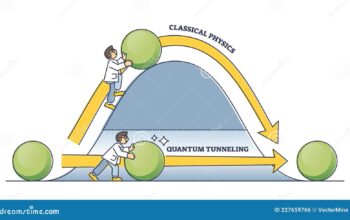Physics embodies an intricate investigation into the fabric of reality, venturing beyond mere observation to uncover the fundamental mechanisms governing the universe. The multidisciplinary nature of contemporary physics fosters a plethora of intriguing research domains. Amidst the vast cosmos of inquiry, this discussion delineates several salient research topics that are currently capturing the attention of physicists worldwide.
1. Quantum Computing
Quantum computing stands at the precipice of technological revolution, harnessing principles of quantum mechanics to perform computations far exceeding the capabilities of classical computers. Researchers are delving into qubits, superposition, and entanglement, seeking to devise algorithms capable of solving complex problems in cryptography and materials science, among others. The exploration of decoherence and fault tolerance remains critical as physicists strive to realize practical quantum systems capable of executing sophisticated tasks.
2. Dark Matter and Dark Energy
The enigmas of dark matter and dark energy constitute some of the most profound questions in modern astrophysics. Comprising approximately 95% of the universe, these elusive entities elude direct detection and challenge existing classification structures within particle physics. Ongoing projects, such as the Large Hadron Collider, aim to elucidate the characteristics of dark matter candidates, while astrophysical observations strive to discern the effects of dark energy on cosmic expansion. The mystery surrounding these phenomena evokes fascination, as insights could fundamentally alter our understanding of the cosmos.
3. Gravitational Waves
The detection of gravitational waves heralded a new epoch in observational astronomy, providing a novel conduit to probe the universe. This groundbreaking research area involves the study of ripples in spacetime generated by cataclysmic events such as black hole mergers. Ongoing efforts to enhance sensitivity through detectors like LIGO and Virgo aim to explore sources of gravitational waves, yielding revelations about neutron star collisions and the dynamics of black hole populations. The intersection of high-energy astrophysics and gravitational wave astronomy creates an exhilarating frontier for physicists.
4. String Theory and Quantum Gravity
String theory emerges as a contender in the quest for a unified framework to reconcile general relativity with quantum mechanics. Concepts involving one-dimensional strings, multi-dimensional branes, and Calabi-Yau manifolds provoke profound mathematical inquiries. This research domain garners attention due to its aspiration to formulate a comprehensive theory outlining all fundamental interactions. Nonetheless, the intrinsic difficulty of empirical verification raises skepticism among physicists, invoking ongoing debates about the legitimacy and utility of string theory in explaining the universe’s underlying laws.
5. The Physics of Time
The nature of time represents a tantalizing subject ripe for exploration. Theories ranging from time as a fundamental entity to models suggesting its emergence from entropic processes provoke profound philosophical inquiries. Scientists aim to dissect the asymmetrical flow of time; why events are perceived to unfold in one coherent direction rather than reversibly. Research in this domain intersects with thermodynamics and temporal mechanics, demanding a comprehensive understanding that bridges conceptual divides between past, present, and future.
6. Quantum Biology
The burgeoning field of quantum biology investigates quantum phenomena’s roles in biological processes. From avian navigation—where quantum entanglement may assist in the precise spatial orientation of migratory birds—to the photoreception processes in plants, physicists and biologists collaborate to unravel the implications of quantum mechanics in life sciences. This interdisciplinary research not only enriches our understanding of biological systems but also poses challenges to the traditional delineations between physics and biology.
7. High-Temperature Superconductivity
The phenomenon of superconductivity, characterized by zero electrical resistance, remains a cornerstone of condensed matter physics. The pursuit of high-temperature superconductors has generated significant interest due to their potential applications in lossless energy transmission and advanced magnetic levitation systems. Ongoing investigations into the interplay of electron pairing mechanisms and lattice dynamics endeavor to unveil the critical factors that govern superconductivity in unconventional materials, such as cuprates and iron-based compounds.
8. Neutrino Physics
Neutrinos, often dubbed as the “ghost particles” due to their elusive nature, are fundamental constituents of the universe that hold pivotal clues regarding its evolution. Research into neutrino oscillations and mass hierarchies continues to perplex physicists, with large-scale experiments such as Super-Kamiokande and IceCube seeking to unravel their enigmatic properties. The implications of neutrino physics extend beyond particle physics, potentially influencing our understanding of cosmic phenomena and the nature of mass itself.
9. The Interface of Artificial Intelligence and Physics
Artificial intelligence (AI) is revolutionizing research methodologies within physics, augmenting analytical capabilities in large data sets drawn from experiments. Machine learning techniques are deployed to identify patterns, optimize experimental designs, and simulate complex systems. This fusion of computational prowess with theoretical physics propels research units into uncharted territories, enhancing our capacity for prediction and analysis across diverse applications, from condensed matter to cosmology.
In conclusion, the landscape of active research within physics remains a dynamic tapestry woven with intriguing questions and conundrums. Each of these highlighted topics encapsulates not just a significant scientific inquiry but also a deeper philosophical exploration into the nature of reality, urging physicists to unearth the profound truths that govern our universe. The pursuit of knowledge in these domains embodies humanity’s incessant quest to understand the cosmos, outreach beyond boundaries, and embrace the unknown.












